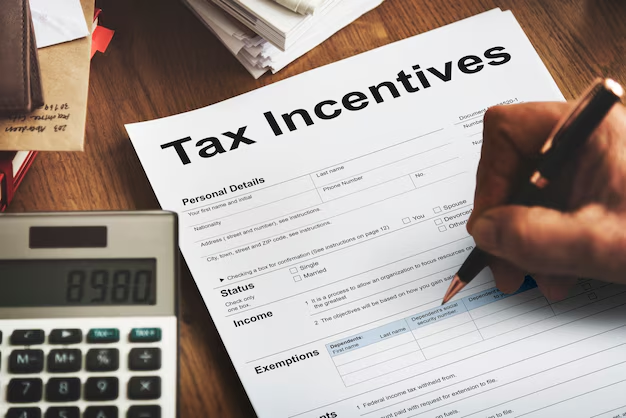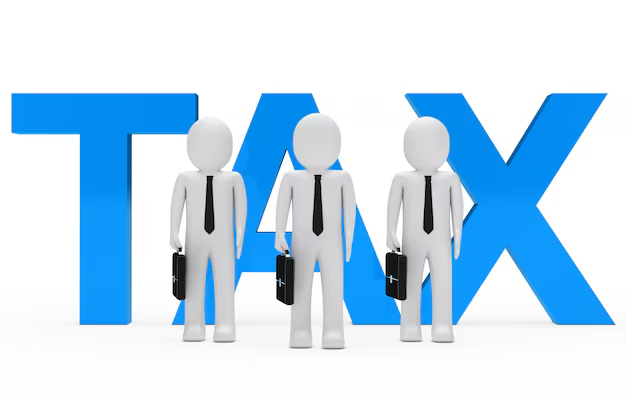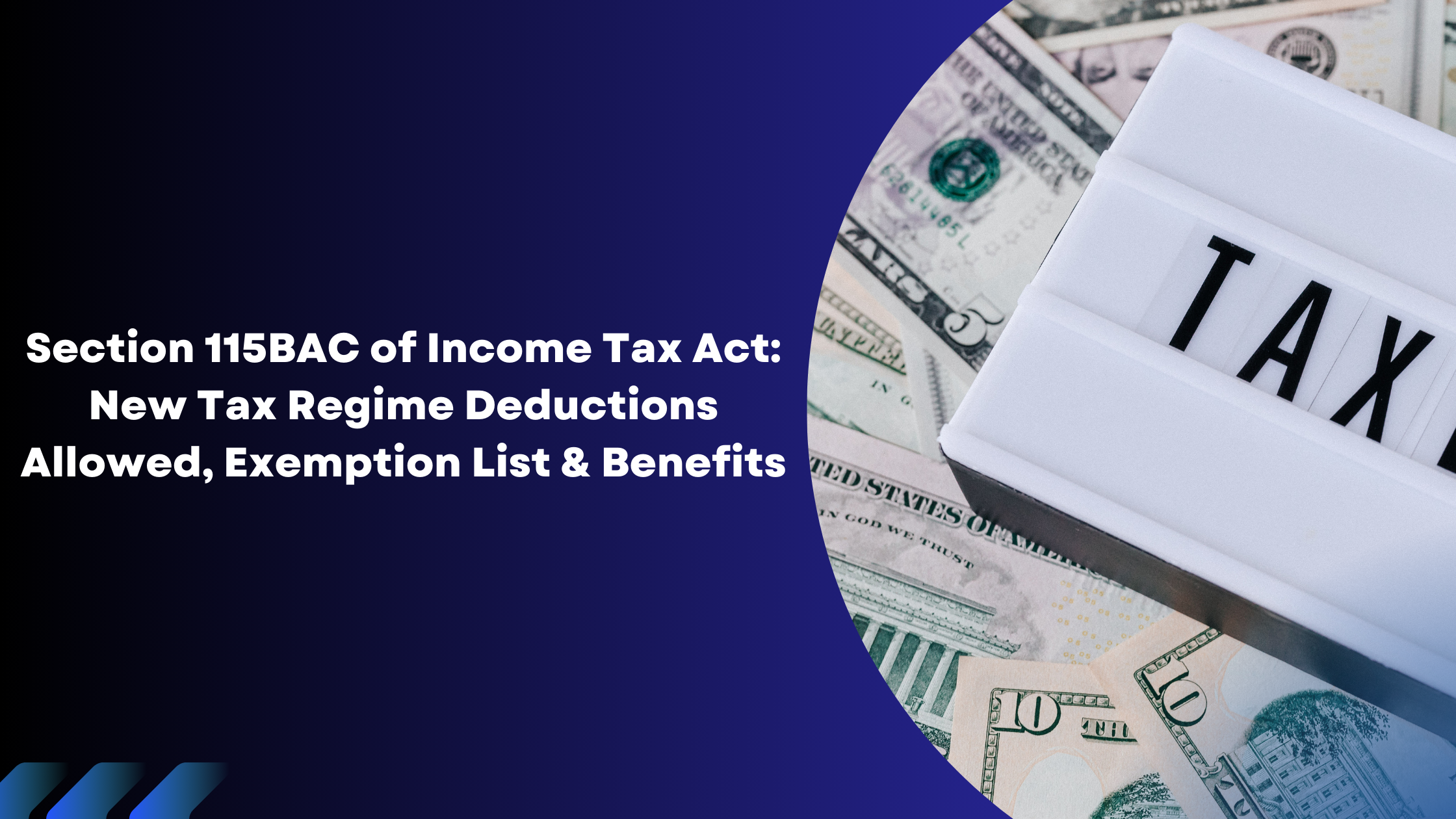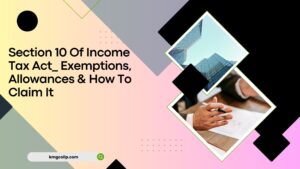What is Section 115BAC – The New Tax Regime?
Section 115BAC, introduced in the Budget 2020, established a new tax regime effective from FY 2020-21 (AY 2021-22). This regime offers reduced tax rates but limits the availability of deductions and exemptions. The regime was updated in the Budget 2023, making it the default option from FY 2023-24. Taxpayers who prefer to continue with the old tax regime must file Form 10-IEA before the due date for their Income Tax Return (ITR).
What are the Tax Rates Under the New Regime?
In Budget 2023, the income tax slabs for the new tax regime were revised. The updated tax slabs for FY 2023-24 (AY 2024-25) and FY 2022-23 (AY 2023-24) are outlined below. Meanwhile, the income tax slabs and rates under the old tax regime remain unchanged.
New regime tax rates (FY 2023-2024) | |
Income Slabs | Rates |
Up to Rs 3 lakh | Nil |
Rs 3 lakh to Rs 6 lakh | 5% |
Rs 6 lakh to Rs 9 lakh | 10% |
Rs 9 lakh to Rs 12 lakh | 15% |
Rs 12 lakh to Rs 15 lakh | 20% |
Income above Rs 15 lakh | 30% |
Here is a comparison of the tax rates under the new tax regime and the old tax regime:
Tax Payable Comparison for FY 2023-24 (AY 2024-25)
Here’s a comparison of the tax payable under the new tax regime and the old tax regime without claiming any deductions or exemptions:
Given that the annual income considered is after the standard deduction under both regimes, here’s an overview of how the new tax regime generally offers tax savings for individuals who do not claim any further deductions or exemptions:
Eligibility Criteria for the New Tax Regime Under Section 115BAC
For the assessment year 2024-25, individuals and Hindu Undivided Families (HUFs) are subject to the new tax regime under Section 115BAC unless they elect to opt for the old tax regime when filing their income tax return before the due date. To qualify for the new tax regime, the total income must meet the following conditions:
- Exclusion of Deductions and Exemptions:
- All deductions under Chapter VI-A, except those specified in Section 80CCD and Section 80JJAA.
- Deductions specified in Sections 35, 35AD, and 35CCC.
- Deductions under Clause (iia) of Section 57.
- Deductions under Section 24(b).
- Deductions under Clauses (5), (13A), (14), (17) of Sections 10, 10AA, and 16.
- Deductions under Sections 32(1), 32AD, 33AB, and 33ABA.
- No Carry Forward of Losses:
- The calculation of total income should not account for any losses from previous assessment years related to the above deductions or from house property.
- No Perquisites or Allowances:
- The income calculation should exclude any deductions or exemptions related to perquisites or allowances.
- No Additional Depreciation:
- The calculation must be performed without considering any additional depreciation as per Clause (iia) of Section 32.
To summarize, the new tax regime requires a straightforward calculation of income without any adjustments for various deductions, exemptions, or carry forward losses. Taxpayers who do not wish to avail these benefits and prefer simplified tax rates can opt for this regime.

Exemptions and Deductions Not Available Under the New Tax Regime
Under the new tax regime, the following deductions and exemptions are not permitted:
- Section 80TTA/80TTB Deduction: This includes deductions for interest income from savings accounts and fixed deposits.
- Professional Tax and Entertainment Allowance: These allowances related to employment are not deductible.
- Leave Travel Allowance (LTA): This benefit for travel expenses is not available.
- House Rent Allowance (HRA): Exemptions for rent paid are not applicable.
- Allowances to MPs/MLAs: These are not eligible for deductions.
- Minor Child Income Allowance: No deductions are provided for income of minor children.
- Helper Allowance: This allowance for domestic help is not deductible.
- Children’s Education Allowance: Exemptions for educational expenses are not allowed.
- Special Allowances [Section 10(14)]: Various special allowances are not deductible.
- Additional Depreciation: Under Section 32(1)(iia), this is not permitted.
- Deductions for Investments: Sections 32AD, 33AB, and 33ABA are not applicable.
- Scientific Research Donations: Deductions under Section 35 for research expenditures are not available.
- Section 35AD or 35CCC: These deductions for specific business investments are not allowed.
- Interest on Housing Loans: Interest on loans for self-occupied or vacant properties under Section 24 is not deductible.
- Chapter VI-A Deductions: This includes deductions under Sections 80C, 80D, 80E, etc., except for Section 80CCD(2) and Section 80JJAA.
- Other Perquisites or Allowances: This includes food allowances (Rs. 50 per meal, up to two meals a day).
- Employee’s Own Contribution to NPS: Personal contributions to the National Pension System are not deductible.
- Donations to Political Parties or Trusts: These are not eligible for deductions.
- Budget 2023 Updates:
- Family pension income deductions: Previously available until FY 2022-23, now included from FY 2023-24.
- Standard deduction of Rs. 50,000: Allowed from FY 2023-24 onward.
Exemptions and Deductions Allowed Under the New Tax Regime
Under the new tax regime, you are eligible to claim the following exemptions and deductions:
- Transport Allowance for Differently-Abled Individuals: Exemption provided for transport expenses incurred by specially-abled persons.
- Conveyance Allowance: Allows for the deduction of expenses incurred for travel as part of your employment.
- Travel Compensation: Any compensation received for travel expenses during tours or transfers is exempt.
- Daily Allowance: Exemption for regular expenses incurred while away from your primary place of duty.
- Official Perquisites: Perquisites provided for official purposes are allowed.
- Voluntary Retirement Scheme (VRS) Exemption: Exemptions under Section 10(10C) for VRS, gratuity under Section 10(10), and leave encashment under Section 10(10AA).
- Interest on Home Loan for Let-Out Property: Deduction available under Section 24 for interest on home loans related to let-out property.
- Gifts Up to Rs 50,000: Tax exemption on gifts received up to this amount.
- Employer’s Contribution to NPS: Deduction for contributions made by the employer to the National Pension System under Section 80CCD(2).
- Additional Employee Costs: Deduction for additional costs incurred for hiring employees as per Section 80JJA.
- Standard Deduction: As per Budget 2023, a standard deduction of Rs 50,000 is applicable from FY 2023-24.
- Family Pension Income Deduction: Deduction under Section 57(iia) for family pension income, introduced in Budget 2023.
- Agniveer Corpus Fund Contribution: Deduction for amounts paid or deposited in the Agniveer Corpus Fund under Section 80CCH(2), introduced in Budget 2023.
For a comprehensive comparison of exemptions and deductions available under both the Old and New Tax Regimes, refer to the detailed list.
Can I Choose Between the New Tax Regime and the Existing Regime?
For salaried taxpayers:
- Opting for a Regime: At the start of FY 2023-24, salaried individuals can choose between the old and new tax regimes. They must notify their employer of their choice. This decision is final for the financial year, although they can revisit their choice when filing their income tax return in July 2024.
- Filing Deadline: The deadline for submitting the income tax return for FY 2023-24 (AY 2024-25) is July 31, 2024, unless an extension is provided.
- TDS Implications: If an employee does not select the old tax regime at the beginning of the year, their employer will apply TDS according to the new tax regime by default. Salaried taxpayers can switch between the new and old regimes each year based on their preference.
For non-salaried taxpayers (those with income from business or profession):
- Regime Selection: Non-salaried individuals must select the new tax regime when they file their tax return. They do not need to declare their choice to anyone during the year.
- Regime Flexibility: Unlike salaried individuals, non-salaried taxpayers cannot alternate between tax regimes annually. Once they opt out of the new tax regime, they cannot opt back in in future years.
How Should I Select the New Tax Regime and Plan My Taxes?
Choosing the right tax regime at the start of the financial year is crucial for effective tax planning. Here’s how you can make an informed decision:
- Compare Tax Liabilities: Evaluate and compare the tax liabilities under both the new and old tax regimes to determine which option is more beneficial for you.
- Plan Accordingly: Once you select your preferred tax regime, plan your investments and calculate your TDS or advance tax payments based on that choice.
- Form Submission: If you decide to opt for the old tax regime, ensure you submit Form 10IEA to the income tax department before filing your return.
By making these decisions early, you can optimize your tax strategy for the year.
Example: When the New Tax Regime is More Beneficial (FY 2023-24)
In the example provided, with an income of ₹12,50,000, the new tax regime offers a substantial tax benefit, saving ₹38,251 compared to the old regime. However, if you are eligible for additional deductions—such as those for interest on a housing loan for a self-occupied property, health insurance premiums, contributions to NPS, or education loans—the old tax regime may result in greater tax savings.
House Property Loss under the New Tax Regime
Under the new tax regime, you are not permitted to claim a deduction for interest on a housing loan for a self-occupied property. Unlike the existing system, which allows a deduction of up to ₹2 lakh, this benefit is not available under the new regime. Consequently, you cannot offset a loss of ₹2 lakh from house property against your salary income.
For let-out properties, you can still claim a deduction for the interest paid on housing loans. However, the new tax regime limits this deduction to the taxable rent received from the property, unlike the old regime. Additionally, you cannot offset any loss from the house property due to excess interest paid over rental income against other income sources. Furthermore, you are unable to carry forward any such loss to future years for adjustment.
Deductions Disallowed Against Business Income Under the New Tax Regime
Under the new tax regime, the following deductions and exemptions are not permitted against business income:
- Additional depreciation as per Section 32
- Investment allowance under Section 32AD
- Sector-specific business deductions outlined in Sections 33AB and 33ABA
- Expenditure on scientific research covered under Section 35
- Capital expenditure claims under Section 35AD
- Exemption for SEZ units specified in Section 10AA
Handling Unabsorbed Depreciation and Business Losses Under the New Tax Regime
For individuals and Hindu Undivided Families (HUFs) with business income, the new tax regime does not allow for the carryforward or set-off of unabsorbed depreciation or business losses. These deductions are unavailable under the new regime because they relate to the exemptions and deductions that have been removed.
Conclusion
From the analysis, it is clear that the new tax regime can be more beneficial for certain income levels. For individuals who choose to claim fewer tax-saving deductions, such as those for NPS or health insurance, the new regime offers a more favorable tax outcome compared to those who rely on these investments for tax relief.
Specifically, individuals with annual incomes between ₹5 lakh and ₹10 lakh, who opt for minimal deductions, will find the new regime advantageous. On the other hand, those in higher income brackets, earning over ₹15 lakh annually, may see greater benefits from the old regime by leveraging various tax-saving investments.
Disclaimer: The materials provided herein are for informational purposes only and do not constitute legal, financial, or professional advice. Consult relevant laws and experts before acting on this information. Neither the author nor K M GATECHA & CO LLP is liable for any inaccuracies or omissions. This material is purely educational and not an advertisement or solicitation.

Table of Contents
Toggle



